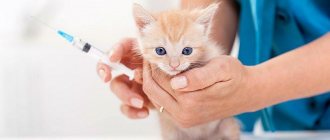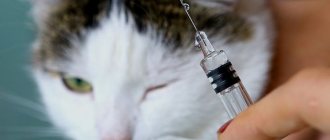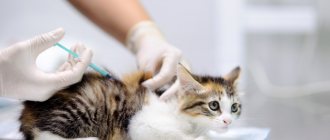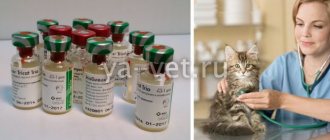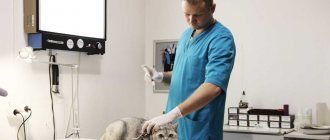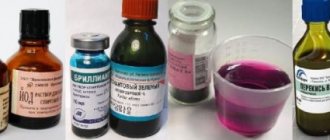One of the most serious diseases found in cats is rabies. A virus that enters a pet’s body leads to irreversible damage to the animal’s brain. Any warm-blooded animal can become infected with rabies, and humans are no exception. This virus is dangerous due to its incurability and the difficulty of determining the onset of the disease. Symptoms of the disease can affect differently, and the incubation period for each pet is individual. This is due to the method of infection and the amount of infection that enters the animal’s blood.
Why do you need to get vaccinated against rabies?
In Russia there is a fight against this terrible disease, and, in connection with this, all pets must be vaccinated against rabies. These measures are mandatory because this disease is not only easily transmitted to humans, but also leads to death. Every year, about 55 thousand human deaths are recorded in the world. So, what does vaccination give:
- Vaccination against rabies helps protect cats from infection throughout the year.
- When a vaccinated animal gets sick, it will not become a carrier of this virus and will not be able to infect other cats and its owner.
- An unvaccinated pet cannot be brought to the exhibition, and permission will not be given to transport it abroad.
- To be able to officially breed offspring, cats and female cats must be vaccinated.
Manufacturers and brands of vaccinations
No vaccine manufacturer guarantees the absence of complications. There are vaccines for which complaints are received more often (Nobivac) and less frequently (PureVax). Other common brands that we do not mention in the article are recommended to a lesser extent. Let's look at the medications that veterinarians usually offer.
Nobivac
Nobivac vaccines (Nobivac, Holland) come in several varieties: Nobivac Tricat against viral rhinotracheitis, calicivirus and panleukopenia, Nobivac Rabies against rabies, etc. There are many complaints about these vaccines. There are serious consequences. Recently there was information in the English-language news that entire batches of the drug led to deaths. However, so far nothing has been proven on this score and the Nobivac vaccine is used by most veterinarians - as a rule, without consequences. In many localities, it remains one of the few ways to protect the animal.
Felocell
The Felocell vaccine (Felocell, USA) is intended for immunization of cats against viral rhinotracheitis, calicivirus infection, panleukopenia and chlamydia. The disadvantage of the quadrivalent vaccine is that it contains a component of chlamydia (it was written above that it is this that causes the main complications). It is better to stick with the trivalent vaccine.
This brand also has a rabies vaccine. As for complications after Felocell, they also occur, but not so often.
Purevax
PureVax (France) is a much less common vaccine. However, veterinarians praise the drug: complications from it rarely occur.
"Purevax" provides immunity from panleukopenia, calicivirus, rhinotracheitis and rabies
It is especially worth paying attention to rabies vaccines, which will be discussed below. In general, Purevax preparations are considered much more environmentally friendly than analogues from other companies.
Disadvantages: higher price and unavailability in many localities. At the same time, ordering the drug via the Internet is dangerous, because... there is no guarantee that it will arrive, as expected, refrigerated.
Other manufacturers
Felinologists warn that allergies and autoimmune reactions are often observed with the Biofel vaccine; the Multifel vaccine is well tolerated, but its ability to develop immunity is questionable. There are also complaints of numerous allergic reactions to the Felovax vaccine.
Basic rules for vaccination
When is it necessary to give an anti-rabies injection? The first vaccine is given to a kitten at the age of 3-6 months. After this, the vaccination is repeated annually. The kitten's first injection should be given after the baby teeth have been replaced.
14 days before the kitten is given a scheduled injection, the pet needs to be dewormed. Vaccination against rabies should only be done against a healthy background; a week before the drug is administered, you need to carefully monitor your pet. On the day of vaccination, you need to undergo an examination by a veterinarian, where his temperature will be taken. A note about the administration of the drug must be placed in the animal’s veterinary passport. You should not give the injection when:
- Cats have an elevated body temperature.
- Vaccination of pregnant cats is not recommended. If the cat has not been vaccinated before, then vaccination is done in the first half of pregnancy, and even then the vaccination must be inactivated.
- Weak animals should not undergo this procedure.
- When cats are suspected of having rabies.
- If the cat was treated with antibiotics, then at least 2 weeks should pass after taking the last tablet.
- Nursing cats should not be vaccinated against rabies.
- There is no need to administer the injection to recently operated animals or pets undergoing rehabilitation.
After a cat has been vaccinated, it develops immunity within 2 to 3 weeks.
The cat is lethargic after vaccination
Hello.
Please help with advice. On July 4 (at 2.5 months) I took my girl Fisa for her first vaccination, they gave her Nobivac Tricat Trio, upon arriving home, she went to her house to sleep, in the evening she didn’t even come out to eat or play, I carried her in my arms to bowl, she sniffed it and went back to bed. Usually in the morning she wakes up my husband and me at 6 am, asks to play with her, but this morning she dozed until 11 am. She got up, ate a little and went back to sleep (I tried to play with her with her favorite toys, but to no avail, she even does not respond to them), slept all day, at 10 pm I got up, ate a little and went back to sleep. I don’t even know what to do, she’s had this condition for 4 days now. I called the vet. clinic, told the situation, they replied that the side effects from the vaccine manifest themselves differently, citing the heat, which they can’t tolerate well, it’s +30 here, it’s stuffy in the apartment. Please help me with advice, I’m at a loss, I don’t know how to help the child, I see that it’s hard for her, or can the veterinarian believe that it’s all because of the heat?
Contact another vet. In my opinion, this is not normal. The vaccination is difficult, my cat is also lethargic after it, but not for more than a day (ttt). The main thing is that there are no complications.
Contact another vet. In my opinion, this is not normal. The vaccination is difficult, my cat is also lethargic after it, but not for more than a day (ttt). The main thing is that there are no complications.
I'll contact another vet tomorrow. clinic, having read the instructions for Nobivac Tricat Trio on the Internet, that all the symptoms are: drowsiness, lethargy, etc. should pass within a day, I understand. there's something wrong with my baby
Contact another vet. In my opinion, this is not normal. The vaccination is difficult, my cat is also lethargic after it, but not for more than a day (ttt). The main thing is that there are no complications.
The same thing happened. Kitten 3 months old, 2 weeks before vaccination, wormed, put first
Source
Main types of vaccines
When the owner goes to a state veterinary hospital, he has the right to receive free vaccination, but in this case the kitten will be given a domestic type of injection. There are imported analogues of the domestic vaccine, but they are administered in private clinics. The following types of injections have proven themselves to be quite good: Rabican, Nobivak (Rabies, Forket, Triket), Purevax RCP, Quadriket, Felovax.
All vaccines are divided into live and inactivated. Live types of injections contain weakened types of the virus, and inactivated types contain a non-living type of virus or its fragment.
Vaccination against rabies should be carried out in a veterinary clinic, because the refrigerated storage conditions and the validity period of the drug are observed there.
Most side effects occur when a live virus is administered. The pet gets sick for the first few days after administration. When introducing an inactivated type, side effects do not occur; they are tolerated more easily by the pet.
Complications in cats after vaccination
It is for these reasons that veterinarians recommend timely vaccination of cats - in other words, vaccinations. Today, veterinary clinics use high-quality drugs that do not cause life-threatening consequences for the cat.
Still, sometimes owners face a number of complications, and it is important to know what to do in this situation
Cat after vaccination
Complications in cats after vaccination can occur for a number of reasons. One of the main reasons for unpleasant consequences may be vaccination during a cat's illness. Be sure to have your animal examined by a veterinarian, undergo a full examination and treatment for parasites. Only healthy individuals need to be vaccinated.
The second factor is an allergy to some component of the vaccine or intolerance to a certain drug. This happens extremely rarely, but it is still worth being vigilant and closely monitoring your pet after vaccination.
On the first day after vaccination, your cat may experience non-life-threatening symptoms:
lethargy and weakness;
lack of appetite and nausea;
slight increase in temperature;
increased thirst or, conversely, refusal of water;
swelling and slight inflammation at the injection site.
This is a completely normal reaction to the vaccine, so there is no reason to worry. But if you notice that the symptoms intensify and last for several days, be sure to consult a doctor. Hidden diseases that were not detected during the examination could have become active in the animal’s body, and this already seriously affects the cat’s health.
Caring for the animal after vaccination
It is very important to provide your tailed pet with proper care and care.
Please pay attention to several factors:. Nutrition
Feed the animal easily digestible, but high-calorie food. Even if your cat refuses to eat, this is normal, but make sure she always has access to fresh water. Take a closer look to see if your pet drinks. If the cat does not touch liquid for more than two days, go to the doctor, otherwise the cat is at risk of dehydration.
Nutrition. Feed the animal easily digestible, but high-calorie food. Even if your cat refuses to eat, this is normal, but make sure she always has access to fresh water. Take a closer look to see if your pet drinks. If the cat does not touch liquid for more than two days, go to the doctor, otherwise the cat is at risk of dehydration.
Indoor climate. The animal’s body is weakened during this period, so try to protect your pet from drafts and too cold floors.
Communication with other animals. Immediately after vaccination, it is better to isolate the cat from contact with other pets - it may feel discomfort and a desire to hide in a dark corner.
Well, the most important “medicine” is your love and care. It's not enough to just get vaccinated. Much more important is an attentive attitude towards the animal, for which your cat will repay you with sincere devotion.
Is the vaccine dangerous?
Some cat owners have the opinion that if the cat does not leave the house, then there is no need to vaccinate it. However, this is an erroneous judgment, because the virus can be carried by the host on shoes or clothes. Of course, the risk of infection in cats is not great, but this disease is 100% fatal. It is rare that an animal can recover from this terrible disease.
The opinion about the dangers of vaccination is outdated. Previously, the phenol vaccine was administered, it gave many allergic reactions in cats. That is why it was subsequently excluded from use. New generation vaccinations do not cause allergic reactions. No negative phenomena have been registered in recent years; the maximum that can occur is a slight rise in temperature. Currently, vaccinations have been invented, the period of administration of which has been increased to 3 years. But there are some difficulties with their introduction, because in order to eradicate this disease, the state requires the annual administration of the drug, regardless of its name.
What vaccinations cause complications?
A vaccine from any manufacturer can cause complications and an allergic reaction. This does not always depend on the quality of the drug. Let's figure out what modern veterinary medicine offers vaccinations for and which of them can be dangerous.
Panleukopenia
Panleukopenia (distemper) is an infectious disease of cats that leads to death. Therefore, you need to get vaccinated. Moreover, the panleukopenia vaccine itself is considered relatively safe. If you are vaccinated against plague with a monovaccine (there are no components of other pathogens in it), then adverse reactions from such a drug are rare. Perhaps it is not recommended to give injections to pregnant cats in order to prevent neurological diseases in kittens. Also, you should not give the injection to kittens younger than 4 weeks.
Rhinotracheitis and calicivirus
Rhinotracheitis and calicivirus are often fatal diseases, so it is necessary to vaccinate your pet against them. Typically, these components are included in trivalent and quadrivalent vaccines along with panleukopenia and sometimes chlamydia. Rarely, components of the rhinotracheitis and calicivirus vaccine may cause mild fever, sneezing, conjunctivitis, lameness, and pain at the injection site. But such symptoms soon pass.
Rabies
The most common complications occur with rabies vaccination. In 4 out of 10 thousand cases, such vaccines cause sarcoma (cancer). This disease is associated with drugs containing adjuvants - auxiliary components of the vaccine. So far, there is only one rabies vaccine in the world without adjuvants: PureVax Feline Rabies Vaccine from the French company Merial. It has proven effectiveness and its use does not lead to the development of sarcomas.
Leukemia
Leukemia vaccines sometimes cause swelling and pain at the injection site, lethargy, fever, and granuloma. And although there have been no complaints about the occurrence of sarcomas associated with vaccination against leukemia, the drug contains adjuvants and therefore can be considered potentially dangerous in this regard. A new vaccine is currently being developed that does not contain adjuvants. However, leukemia is not included in the list of mandatory vaccinations.
Chlamydia
The chlamydia vaccine is not mandatory. On the contrary, it is not even recommended, because... Chlamydia in cats is not dangerous, and protection with the vaccine is ineffective. At the same time, the frequency and severity of complications after vaccination are high. Among the most common are depression, anorexia, and fever.
The problem is that the chlamydia component is included in a number of polyvalent vaccines, for example, Felocell. As a result, cats are comprehensively vaccinated against chlamydia along with panleukopenia, rhinotracheitis and calicivirus. It is the chlamydial component that in most cases is to blame for complications.
Mandatory vaccination against chlamydia is indicated only in cases where the animal is kept in high-risk conditions: for example, there are several animals in the house and one of them is a carrier of the disease.
It is important to know
If a kitten is bitten by a stray animal on the street, you should immediately contact a veterinary clinic. Perhaps the veterinarian will not wait until the time left before revaccination, but will do it on the same day. 10 days after the bite, the kitten needs to be re-examined, as the veterinarian may detect some symptoms that the owner will not even pay due attention to. In this case, the cat will be isolated from the family until the diagnosis is refuted or confirmed. Because if the disease is confirmed, it will not be possible to help the pet, but it will be necessary to protect the family from infection. Some owners are interested in how long a cat needs to be isolated? No less than 1.5 months. This is the time it will take to be sure how safe the animal will be in the family.
Of course, you need to vaccinate your cat against rabies, as this will not only protect the animal, but also its owner.
Stages of development of rabies
A disease called rabies, which occurs after the bite of a sick animal, requires immediate medical attention. If everything is left to chance, the virus will disrupt the functioning of the human central nervous system, causing encephalitis. The result is the occurrence of severe disturbances in the functioning of the body, death. Rabies develops through several stages:
- bite and infection. This is a latent period of illness that lasts from one to several months. The speed of spread of the virus depends on the affected area on the body; the closer it is to the head, the faster the course of the disease. The period of three months is average for people whose legs or arms are injured;
- the second stage is characterized by dry mouth, headaches, and weakness. A lot of time has passed since the bite, but pain symptoms may appear in the damaged area. It is important to follow the rule here - you cannot wipe it with alcohol. Such an operation will lead to an even faster spread of the disease. At this stage, a person may experience fear, loss of appetite, and depression. After a few days, auditory and visual hallucinations occur;
- the next stage is excitement and hydrophobia. The injured person refuses water. He is afraid of liquids and does not drink them. The patient suffers from spasms and sore throat. Foaming at the mouth and an aggressive state are signs of the end of the third stage;
- the final stage is paralysis. The infected person stops being aggressive, calms down and seems to be on the road to recovery. This is wrong! This condition progresses to a sharp increase in body temperature up to 42 degrees, and paralysis occurs. The result is death.
In order not to encounter such stages that are terrible for a person, it is necessary to immediately seek qualified help from a hospital after an animal bite. As long as the disease has not entered the active phase, to recover from it. Here it is important to remember that rabies vaccination and alcohol are incompatible things. Do not use alcoholic drinks to further aggravate the situation.
What is the gag reflex
In purring cats, vomiting occurs frequently - this is a manifestation of the normal functioning of the cat's gastrointestinal tract. But sometimes the gag reflex becomes a symptom of a serious illness.
Vomiting is a spontaneous action of the body. A special center located in the animal’s brain gives the command to eject the contents of the intestines. When a cat feels bad, it vomits - its body protects itself by removing poisons, toxins, excess food and foreign bodies that have entered the stomach.
But gagging is the tip of a huge iceberg. The brain center gives orders and is activated for other reasons (illness, increased intracranial pressure, gastrointestinal pathologies). Sometimes the cat vomits in the car - when the cat is shaken violently, its vestibular apparatus cannot cope and sends a danger signal to the brain. The result is vomiting.
Cat vomiting is a universal and multifaceted symptom. The owner of a furry cat needs to know everything about this reflex in order to figure out in time what is happening to the pet and respond competently.
How often should a cat be vaccinated?
A veterinarian can create a vaccination schedule. There are optional and mandatory vaccinations. Vaccination against rabies is mandatory for cats that go outside.
Kittens are vaccinated from 3 months of age. Subsequent ones are carried out annually. But depending on the type of vaccine, the timing may vary. So, if used:
- Nobivak Rebis - cats need to be vaccinated from 5 months.
- Rabizin - from 6 months. Next vaccination in 3 years.
- Quadricate - kittens are vaccinated from six months of age.
- Rabican is a Russian vaccine. It is done for free, but has many negative reviews due to side effects. Repeatedly done after 2 years.
Thus, how often to vaccinate is determined by the veterinarian, taking into account the serum used.
Prevention
In order for everything to go well, it is better not to carry out disease prevention while the animal is pregnant.
To minimize the risk, you must adhere to certain rules. The vaccination must be done by a specialist in the clinic, so that the cat is under the supervision of a doctor for an hour. It is necessary to check the expiration date of the vaccine. Injections should be given when the animal is healthy and not wormed. Adhere to the vaccination and revaccination dates. After vaccination, do not bathe, do not wash the injection site, and do not overcool. Be sure to comply with quarantine. During teething in kittens and pregnancy in adult cats, it is better to abstain.
The owner should monitor the pet's condition in the first week. The cat stopped eating and drinking, vomited, a wound or other symptoms listed above appeared at the injection site; this must be reported to the veterinarian. Only he will decide whether to take measures for treatment. If a cat vomits, this may be a common individual symptom, or it may indicate the onset of anaphylactic shock.
Tips and tricks
Despite the frightening list of possible adverse reactions and complications from vaccines, the main thing to remember is that severe consequences are extremely rare and they know how to deal with them, and local and general reactions are not so frequent, mild and not dangerous to health.
However, for several days or weeks after vaccination (how long depends on the specific vaccine), you should carefully monitor your child's well-being:
- High fever for 3 or more days, shortness of breath, convulsions, frequent vomiting, severe headache and other noticeable and persistent deviations from normal health are a reason to call a doctor.
- The administration of a vaccine is always an additional burden on the body, sometimes quite significant, so in the first days after vaccination you should rest more and avoid noticeable physical and emotional stress.
- When the temperature rises above 38°, antipyretic drugs are used in combination with physical methods - cold compresses, wiping with a damp sponge. It is especially important to reduce the temperature in children prone to seizures and with hypertensive-hydrocephalic syndrome.
- Carefully monitor the condition of the body if a vaccinated child, especially a child, has a high risk of allergic reactions.
- During the first 2 weeks before and after vaccination, it is better to avoid foods that are obligate allergens: seafood, honey and chocolate, eggs, strawberries, raspberries, citrus fruits.
- In the first 7-10 days, try to avoid contact with other people to reduce the risk of colds. This is especially true for people with reduced immunity and chronic diseases.
- It is recommended to do a general urine test 3 to 4 weeks after vaccination to identify possible kidney complications: this is especially important for children with diseases of the urinary organs. The analysis will also allow timely detection of deviations and take the necessary measures.
Allergic and anaphylactic reactions to vaccination in cats.
Allergic reactions occur when the immune system overreacts to foreign substances entering the body.
Anaphylactic reactions are very severe allergic reactions that affect the condition of the entire body. They pose a danger to life even with timely assistance.
Typically, the organ most susceptible to allergic reactions is the cat's lungs. When reactions are severe enough, clinical signs include coughing (possibly with blood), difficulty breathing, collapse, and death.
Another target of allergic attacks is the digestive tract. In cats, vomiting (severe) and diarrhea, sometimes with blood, may occur.
Other serious reactions can affect blood vessels (vasculitis), red blood cells (Immune-mediated hemolytic anemia), platelets (Immune-mediated thrombocytopenia), and any other organ in the body.
Mild allergic reactions can cause swelling of the face, swelling of the extremities, and itching.
Foreign substances that can cause allergic (anaphylactic) reactions are often found in vaccines, medications, food, and so on.


